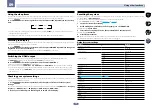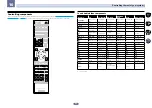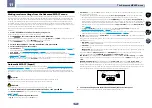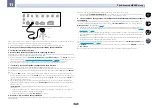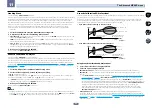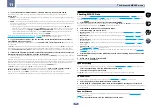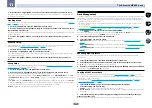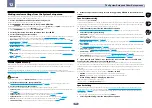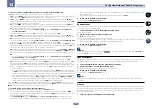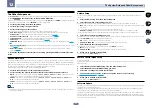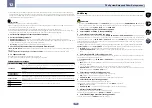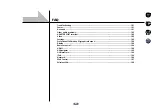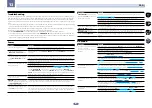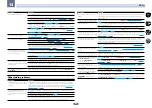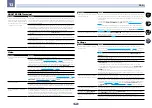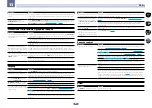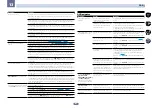
90
11
The Advanced MCACC menu
2 When ‘MCACC’ is highlighted, use
k
/
l
to select the MCACC preset you want to check.
The distance from the various channels set at the selected MCACC preset is displayed. ‘
---
’ is displayed for chan-
nels that are not connected.
Standing Wave
Use this to display the standing wave related adjustment values for the various MCACC memories. See
Standing
Wave
on
page 88
for more on this.
1 Select ‘Standing Wave’ from the MCACC Data Check menu.
2 When ‘Filter Channel’ is highlighted, use
i
/
j
to select the channel for which you want to
check standing wave control.
The standing wave related calibration value for the selected channel stored at the selected MCACC preset and its
graph are displayed.
3 Press
k
to highlight ‘MCACC’, then use
i
/
j
to select the MCACC preset you want to
check.
Acoustic Cal EQ
Use this to display the calibration values for the frequency response of the various channels set in the different
MCACC presets. See
Acoustic Calibration EQ Adjust
on
page 88
for more on this.
1 Select ‘Acoustic Cal EQ’ from the MCACC Data Check menu.
2 When ‘Ch’ is highlighted, use
i
/
j
to select the channel.
The calibration value for the frequency response of the selected channel stored at the selected MCACC preset
and its graph are displayed.
3 Press
k
to highlight ‘MCACC’, then use
i
/
j
to select the MCACC preset you want to
check.
Group Delay
Use this to display the calibrated speaker group delay results. See
Better sound using Phase Control and Full
Band Phase Control
on
page 58
for more on this.
1 Select ‘Group Delay’ from the MCACC Data Check menu.
2 When ‘Channel’ is highlighted, use
k
/
l
to select the channel you want to check.
The result of group delay calibration for the selected channel is displayed.
When measurements have been performed with
Full Auto MCACC
selected at
Advanced MCACC
or with
ALL
or
Full Band Phase Ctrl
selected when
Auto MCACC
is selected, the graph before group delay calibration is also
displayed.
When
After
is selected at
Calibration
, the group delay after calibration is displayed. Compared to when
Before
is selected, with
After
there is less difference in the delay between frequency bands and the group delay between
the different channels is uniform, allowing you to check the full band phase control effect.
No Data
is displayed if the selected group delay has not been measured.
Data Management
This system allows you to store up to six MCACC presets, allowing you to calibrate your system for different listen-
ing positions (or frequency adjustments for the same listening position). This is useful for alternate settings to
match the kind of source you’re listening to and where you’re sitting (for example, watching movies from a sofa,
or playing a video game close to the TV).
From this menu you can copy from one preset to another, name presets for easier identification and clear any
ones you don’t need.
!
This can be done in
Automatically conducting optimum sound tuning (Full Auto MCACC)
on
page 42
or
Automatic MCACC (Expert)
on
page 85
, either of which you should have already completed.
1 Press
on the remote control, then press HOME MENU.
A Graphical User Interface (GUI) screen appears on your TV. Use
i
/
j
/
k
/
l
and
ENTER
to navigate through the
screens and select menu items. Press
RETURN
to exit the current menu.
2 Select ‘Data Management’ from the Home Menu.
3 Select the setting you want to adjust.
!
Memory Rename
– Name your MCACC presets for easy identification (see
Renaming MCACC presets
on
page 90
).
!
MCACC Memory Copy
– Copy settings from one MCACC preset to another (see
Copying MCACC preset data
on
page 90
).
!
MCACC Memory Clear
– Clear any MCACC presets that you don’t want (see
Clearing MCACC presets
on
page 91
).
Renaming MCACC presets
If you have several different MCACC presets that you’re using, you may want to rename them for easier
identification.
1 Select ‘Memory Rename’ from the Data Management setup menu.
2 Select the MCACC preset you want to rename, then select an appropriate preset name.
Use
i
/
j
to select the preset, then
k
/
l
to select a preset name.
3 Repeat for as many MCACC presets as necessary, then press RETURN when you’re finished.
You will return to the
Data Management
setup menu.
Copying MCACC preset data
If you want to manually adjust the Acoustic Calibration EQ (see
Manual MCACC setup
on
page 87
), we recom-
mend copying your current settings to an unused MCACC preset. Instead of just a flat EQ curve, this will give you
a reference point from which to start.
!
The settings made in
Automatically conducting optimum sound tuning (Full Auto MCACC)
on
page 42
or
Automatic MCACC (Expert)
on
page 85
.
1 Select ‘MCACC Memory Copy’ from the Data Management setup menu.
2 Select the setting you want to copy.
!
All Data
– Copies all the settings of the selected MCACC preset memory.
!
Level & Distance
– Copies only the channel level and speaker distance settings of the selected MCACC pre-
set memory.
3 Select the MCACC preset you’ll be copying the settings ‘From’, then specify where you
want to copy them (‘To’).
Make sure you don’t overwrite an MCACC preset you’re currently using (this can’t be undone).

